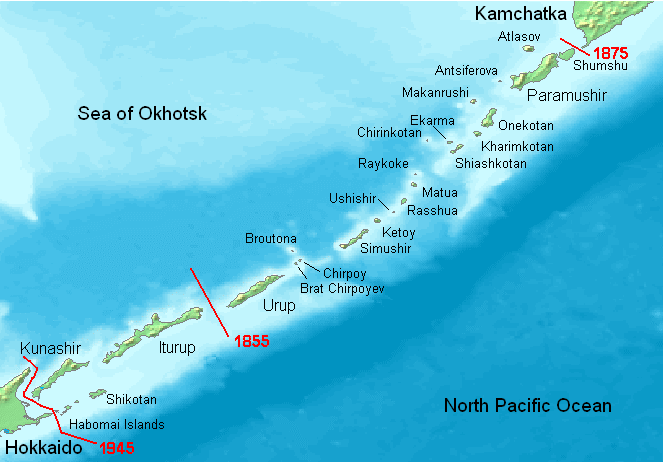The Kuril Islands
Located between the
Japanese island of Hokkaido and the Russian Kamchatka Peninsula, the Kuril
Islands are an archipelago consisting of 22 main islands and separate the Sea
of Okhotsk from the North Pacific Ocean. With a combined area of 6,000 square miles, the Kuril Islands are hardly
considered major land masses, but have nevertheless become major conflict in
Russo-Japanese bilateral relations. Specifically, the conflicts over the Kuril
Islands are centered on the southern islands of Kunashiri, Iturup, Shikotan,
and the Habomai rocks. Both Russia and Japan are in dispute over the sovereignty of the four islands,
with both nations citing history and past treaties as support for their claims.
Various factors have influenced Russia’s foreign policy regarding the disputed
islands including the overall benefits of the islands, domestic opinion, and
international environment. The conflict over the Kuril Islands is a classic
example of centrifugal forces within the context of Russian foreign policy.

The
Influence on Russo-Japanese Relations
The effect of the Kuril dispute on Russian and Japanese relations can hardly be understated. In the Putin era, poor Russia and Japanese relationship directly correlates with the stalemate over the Kuril Islands. The dispute over Kuril Islands is a classic example of a centrifugal force affecting foreign policy. Japan and Russia would both benefit from resolving the Kuril issue but the previously discussed factors are major barriers to a bilateral agreement. According to one article, “The never-ending dispute over the Kuril Islands is of disadvantage to both Russia and Japan: the resolution of the dispute would allow Japanese investment to improve the economy and living standards in Russia's far-flung province. For Japan, settlement of the issue would help weaken bumptious far-right groups that have the potential to complicate domestic politics and spark international crises.”[1] The possibility of a major eastern economic partner in Japan is seen as a major benefit to Russia and can act as a counterbalance to Chinese influence. Although the issue remains currently unresolved, recent developments have shown signs of a positive turn in Russian and Japanese relations.
[1] Anthony Wohns, "Island Warfare," Harvard International Review 34 (2013),
no. 4: 8-9,
http://eds.b.ebscohost.com/eds/pdfviewer/pdfviewer?sid=28d0fb87-141f-4708-b113-455b23325387%40sessionmgr114&vid=2&hid=114
No comments:
Post a Comment